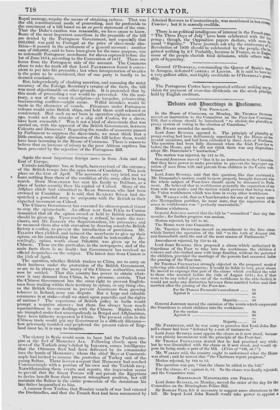Again the most important foreign news is from Asia and
the East of Europe.
Certain intelligence has, at length, been received of the entrance of the British troops into the open town of Candahar. This took place on the 21st of April. The accounts are very brief, and we
s learn nothing from them of the condition of the army after its long march. Don ilon.i m1:1) has sent his foully to lioklutra, as a place of better security than his capital of Cabool. Many of the Afghan chiefs had submitted to SIIAII SHOOJAII, who had been crowned at Candahar. It is said that Rux.i.Err SI'NGII had de- spatched a powerful army to coiiperate with the British in their expected movement on Cabool.
The Chinese Government has executed its often-repeated threat to stop the opium-trade. An officer sent from Pekin to Canton demanded that all the opium owned or held by British merchants should be given up. Upon receiving a refusal, he made the mer- chants, and Mr. ELLIOTT the Superintendent, his prisoners ; and he menaced them also with starvation by drawing round the British factory a cordon, to prevent the introduction of provisions. Mr. ELLIOTT then yielded, and induced the merchants to give up their opium, on his undertaking that they should be indemnified. Ac- cordingly, opium worth about 700,000/. was given up to the Chinese. These are the particulars in the newspapers ; and of the main facts there is no doubt : but Government has received no official despatches on the subject. The latest date from Canton is the 15th of April.
The question, whether British traders to China are to carry on their business under the protection of the British Government, or are to be always at the mercy of the Chinese authorities, must now be settled. That this country has power to obtain what- ever it may demand from China, is, we presume, certain. That the Chinese Government has the same right to prevent English- men from trading within their territory in opium, or any thing else, as the British Government to prevent Americans from growing tobacco in Ireland, none can dispute. But a large and valuable commerce is at stake—shall we stand upon punctilio and the rights of nations ? The experience of British policy in India would prompt a negative answer; but there has always been much squeamishness in our dealings with the Chinese. Rights, which are trampled under foot unscrupulously in Bengal and Aff0anistan, have been hitherto respected in China. The present crisis in the Chinese trade would pitt any Government in a difficult dilemma— how grievously troubled and perplexed the present rulers of Eng- land must be, it is easy to imagine.


























 Previous page
Previous page